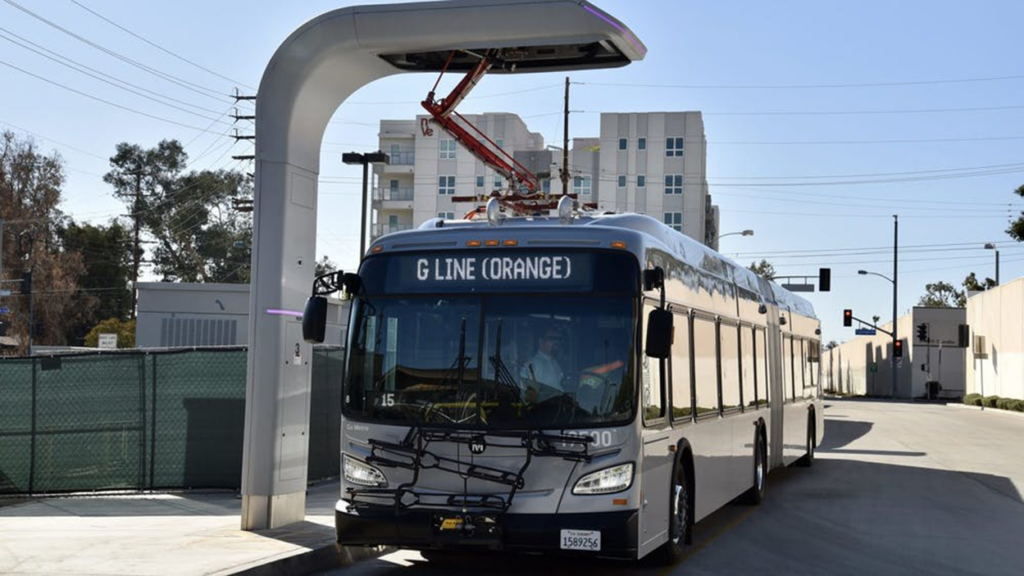In The News
L.A. Metro’s G Line now fully electric
Published by Mass Transit Magazine

L.A. Metro has phased out its legacy 60-foot articulated CNG buses on the G Line — the type that has run on the dedicated BRT line since it opened in October 2005 — and replaced them with 40 new, 60-foot articulated zero-emission buses.
The Los Angeles County Metropolitan Transportation Authority’s (L.A. Metro) G (Orange) Line has completely transitioned to an all-electric bus fleet, offering customers a non-polluting, quiet and ultra-smooth riding experience.
L.A. Metro has phased out its legacy 60-foot articulated compressed natural gas (CNG) buses on the G Line — the type that has run on the dedicated bus rapid transit line since it opened in October 2005 — and replaced them with 40 new, 60-foot articulated zero-emissions buses manufactured by New Flyer. The buses feature zero tailpipe emissions and employ advanced electric technologies such as high-energy batteries and traction propulsion system.
“Metro is officially on the road to a zero-emissions future with its first official use of electric buses on a major Bus Rapid Transit Line,” said L.A. Metro Board Chair and Chair of the L.A. County Board of Supervisors, Hilda L. Solis. “This marks the beginning of Metro’s commitment and long-term investment in a healthier, more equitable, and sustainable bus fleet for L.A. County, one that helps our region reduce its greenhouse gas emissions at the tailpipe while greatly improving the customer experience.”
Rapid en-route chargers installed at North Hollywood, Canoga and Chatsworth Stations give the buses an all-day operating capability along the 18-mile corridor. L.A. Metro says buses have about a 150-mile range on a single charge without rapid charging.
The new electric buses contribute to L.A. Metro’s equity goals to help reduce disparities in access to opportunity, including health outcomes, in key communities along the bus corridor. Of the G Line’s 36 stops, 20 (or 55 percent) are directly located in or adjacent to Equity Focus Communities across North Hollywood, Valley Village, Van Nuys, Lake Balboa, Reseda and Canoga Park.
L.A. Metro first began converting its bus fleet to electric buses in July 2020. Since completing its transition from CNG to electricity earlier this year, L.A. Metro has officially logged 900,000 miles on the electric buses.
“Transportation is not just the largest source of air pollution in our state — it’s one of our greatest opportunities to realize our vision of cleaner air, lower emissions and healthier communities,” said L.A. Mayor Eric Garcetti. “If we’re going to act this decade to save our planet, we need to see solutions on our streets today — and watching these zero-emission buses roll down our roads brings us one step closer to turning the tides of the climate crisis.”
The buses contain active suspension that ensures a smooth ride for passengers. Buses also employ dual electrically driven air conditioning units. Customers can charge their portable devices using USB ports embedded in the bus seats. The buses also have public Wi-Fi access to better connect bus customers on the go. Lastly, the buses also feature two drive axles for better acceleration and employ regenerative braking to recapture energy.
L.A. Metro’s electric buses cost $1.15 million each. The project includes the deployment of the electric buses and associated charging equipment and infrastructure improvements. The total cost of buses, equipment and improvements is $80 million.
L.A. Metro is now planning to utilize electric buses on the J (Silver) Line that operates between San Pedro and El Monte via the Harbor Gateway Transit Center. The agency is now working closely with Caltrans, Los Angeles Department of Water and Power and Southern California Edison on charging designs along the J Line corridor. The ultimate conversion of the J Line to electric buses is anticipated to be completed in approximately two years.
“Today we are working tirelessly to create a more environmentally sustainable, equitable and resilient public transportation system for all our customers,” said L.A. Metro CEO Stephanie N. Wiggins. “Our zero-emission bus goals are an important part of our overall strategy to reduce our agency’s carbon footprint and become carbon neutral. We continue as a transit leader in our march towards a more sustainable and resilient transportation system that will benefit our customers, our industry and our planet.”
L.A. Metro notes it has ambitious plans to transition from a CNG to zero-emissions bus fleet in the years ahead. In 2017, the L.A. Metro Board unanimously adopted a motion endorsing a comprehensive plan to transition the agency to a 100 percent zero-emission bus fleet by 2030. The agency currently operates approximately 2,300 CNG buses. The plan is contingent on continuous advancements in electric bus technology – which includes an increase in range, reduction of charging times and extension of battery life cycles – and a drop in price as the technology develops.
Overall, L.A. Metro says it also has strong environmental sustainability commitments. The agency plans to displace more than 780,000 metric tons of Carbon Dioxide Equivalent in L.A. County by 2050 through an ambitious suite of sustainability initiatives envisioned in its 10-year Sustainability Strategic Plan, Moving Beyond Sustainability.
Related
In The News
Large New York Order for New Flyer
Read More
In The News
NFI subsidiary New Flyer awarded two contracts from New York for up to 2,090 Xcelsior® transit buses
Read More
In The News
New Flyer sells +200 e-buses in New York (with options for further 1,200)
Read More